To India by boat“What would you really like to do?” “Go to go India by boat.” “What?” “I want to go to India by boat like the people used to go. I want to take the time to get there. I want to change slowly.” “How can we do that?” “We can go by cargo boat.” We were having a casual conversation in Finisterra, Spain, a few weeks before we gave ourselves to each other in marriage. I was startled, looking for a much smaller, simpler answer. We parted a couple weeks; I returned to the U.S. and Petra to Germany, each to tie loose strings. India was on our minds too. When we returned to Santiago, Petra said, “I entered ‘to india by boat’ into Google. Then I learned about the Pacific Senator that is going to Mumbai in January. We can go by boat. And it is only about 100 dollars a day for each of us. It takes 21 days.” That was a relief. At least it wasn’t cruise-ship prices.
“Shall we do it?” “Why not? Let's do it.” It was pretty much settled. Dec. 12, 2003: We married before Santiago in the cathedral and began an odyssey that took us through Portugal, Spain, and half way across southern Europe to a boat on the tip of Italy, our embarkation point. Along the way we did a lot of paperwork via email, fax, and phone. Our honeymoon had begun. We registered with the travel agent and paid for our passage by phone with our credit card as we passed through in Fatima. I had gotten an Indian visa back in the States and Petra in Germany. At least that was taken care of. In southern Portugal, we learned the container ship was stopping in Karachi. We had to return to Lisbon for Pakistani visas. We got them in two hours on a Friday afternoon. Thank you to everyone at the consulate for making that happen in record time. While in Lisbon, we also faxed forms to our doctors to get their OK for us to go on the container ship. Both were faxed back with approvals. The ship would not stop for sick passengers. The cargo was first priority. And then we tried to get yellow fever shots only to give up in the end. The bureaucracy required too much of us and our pocket books. Back on the road, we stayed a week on the beach in southern Portugal before visiting Seville and Granada. It was then across Spain and along the French coast to Italy. We finally got yellow fever shots in Rome at a convenient clinic with the help of our hotel clerk. Also in Rome, we got our almost final papers--26 of them by fax. That caused a minor incident as we checked out of the hotel the next morning. They wanted a Euro for each page faxed to us. After considerable argument that no one else charges for incoming faxes, we settled on paying half of what they wanted originally in the interest of getting on the road. They agreed. When we got the final, final papers in Sorrento the next day, they charged us nothing for the incoming faxes. Jan. 10: We arrived in Gioia Tauro in southern Italy, three days less than a month after leaving Santiago. The Pacific Senator, a 250-meter (820-foot), German container ship flying the Panamanian flag was due to leave in a few days. In the meantime, we packaged up extra things to send to Petra's mom in Germany and, not wanting ties in Italy, we sold Petra’s car for 50 Euros and a bag of oranges. The car's registration papers had been pickpocketed from me in Lisbon so we had to take the small compensation. That Italian got a good buy. Jan. 13: We had our last cups of Italian coffee with breakfast. Mama there mixed her own blend from five coffees. She offered it as our last real coffee for a long time. It was superb. Few since have matched it. All was not done. We took our package to the post office. It had to be re-packaged (it needed paper and string—a no-no in the US). Back at the hotel, the agent from the shipping company appeared. He knew just the place to get the package done and then took us to the post office to mail it. Soon the he had us through the harbor gate and standing at the bottom of a set of steps going up the side of a huge ship. After swaying to the top, we meet one of the officers who took us to our quarters on the fourth floor. Captain Gert, a German, met us and told us we were the only passengers so we could have either or both of two passenger cabins. Later in the evening, we choose the starboard (left side) room directly under the captain’s room. We could hear the thump-thump-thump of the rotating propeller less than in the port room. We were in the tower of rooms on the back of the ship behind all the containers. The members of the crew were below us and the captain and chief engineer were in the rooms above. The bridge (the control room) was above them. Our room was spacious and quiet. We had a three-quarters bed and a fold-down twin along with an easy chair, a table and chairs, a large window, a TV, and a lot of VCR tapes. After a late lunch, Captain Gert found us and gave us an extensive tour of the bridge, showing us both the equipment and the view. “You can go anywhere you want on the ship.” We took him up on that one. After the last container was put on at 5:30, we began to leave. A tug came and, by 5:50, someone cast off the lines holding the ship to the land and the tug eased it onto the harbor waters. We watched impressed from the bridge. The ship eased ever so slowly out into the harbor moving toward the setting sun. We headed for the open water. Soon the port was behind and we were alone heading south. This big was moving. It was dark as we entered the straits of Messina a few hours later. The lights of Messina passed on one side and Reggio Calabria on the other. Jan. 14: The boat continued south and then eastward toward the Suez Canal. We began to get used to our new home. We even went down to the “basement” and tried out the sauna. Jan. 15: During breakfast, the engine stopped. The ship drifted powerless for the next 11 hours. It was no accident or problem with the ship. Rather it was a planned stop. We were not due at the anchorage at the north end of the Suez until the next afternoon and we were early. The ship cannot be late for their schedule. But they do not want to be too early either. Both arriving late and the extra anchorage time waiting costs money, a lot of it. Nonetheless, they have to schedule flexibly into the timetable in case it takes longer in some port; but then they have to float idly when they are early--or pay the piper. As the ship sat idle, the wind turned the ship sideways to the waves. It then rocked side to side. Petra got a bit nauseous and listless and lost her appetite during the drifting, but recovered when we started moving again. I noticed no effect from the rolling.This was the only “rough” water during our entire 21 days on board. We had a really calm passage. The captain recounted one passage across the North Atlantic when he literally had to hold on in the corner of his room to keep from being thrown around. He was very sick. Christian, the chief engineer, showed us pictures of containers bent up severely when one got loose and banged around on one heavy day. We ate with the officers three times a day. The food was solid and substantial but not special, very sufficient to feed working people. We did however have a German flavor on the ship, afternoon coffee and cookies. And on Sunday afternoon, a wonderful Schwartzwald cake replaced the cookies. I think it was frozen, but it was really good. The meals were always a chance to catch up on what was happening: how the ship was running; the weather; and how much the captain had to give out as tips (bribes?) to the last harbor pilot. Jan. 16: I woke up to a cupcake birthday cake with a candle and 61 kisses for my 61st birthday. As the day went on, we swam in the 4 by 4 meter (13 by 13 foot) pool. Its water was pumped in from the sea. We went there often. As the days passed, Petra often went to the bridge and asked for the old water to be drained and new water to be let in. Besides the swim, she liked to stand in the gush of the incoming water. After the swim, we cleaned a couple of deck chairs and sat enjoying the sun and wind. Petra even cut my hair. That was the first time in seven years for me. I was getting civilized now that I was married? Around 2:00 pm January 16, we anchored off the north end of the Suez Canal. We watched as the crew let the huge anchor drop into the sea. The chain roared and spewed a red cloud of rust as it rattled into the sea. The canal is one-way. The ships gather and then go in a convoy first one way and then those on the other end come back. By sunset, there were 14 or 15 ships waiting to go through with us. The weather continued in the high 60s with sun and haze, though we did see the buildings of Port Said just before the sun set. We went to bed at eleven but at 1:30 I woke to the lights of Port Said passing. We had begun our way through a ditch what is a legend. I was immediately awake, dressed, and up to the bridge to watch for a bit till we passed the city and were moving south at 6.1 knots. I went back to bed. Jan. 17: We were up by 6:30. Palm trees and small villages were passing outside the windows. We did morning exercise, ate breakfast, and headed for the bow to watch the banks and surrounding countryside go by. We finally left the canal as we passed Port Suez around four. At dinner the captain reported that, “The canal lived up to its nickname, ‘Marlboro Canal.’ The pilots and others got 18 cartons of Marlboros from me.” The evening took us out into the Gulf of Suez on the north end of the Red Sea. Jan. 18: We moved steadily south at between 17.1 (19.7 mph)and 19.1 knots (22 mph). We washed clothes, walked, read, and basked in the sauna and the sun. Along the way Petra taught me how to remove wax from my pants with a paper towel and an iron. My birthday candle spilled on me. The ship was 250 meters (820 feet) long so walking around once was half a kilometer. We walked ten rounds in the morning and ten in the evening almost daily, ten kilometers (6.2 miles) a day. Add some stretching along the way and daily yoga, sauna, and pool and we kept ourselves in pretty good shape for the duration. The rest of our days was taken up with sitting, reading, talking, and watching the workings of the ship and the water go by. There was always something happening, never any boredom. In the afternoon, we received a paper that said we had to turn in all cameras, alcohol, Playboy magazines, and the like to the ship’s storage room that evening in preparation for stopping at Jiddah, Saudi Arabia the next day. The paper said these were very illegal in Saudi Aribia and this sequestration was in preparation for a possible search for such articles when we were in port. No search happened. Jan. 19: At eight in the morning we docked in Jiddah. There was a lot of beeping, whirring, banging, and general noise as they unloaded and loaded all day and into the night. We finally left about 3:30 in the morning. The captain told us that everything on the ship was on a CD and when we got to a port, he handed the CD over to the harbor master. The CD told where each item was located on the ship, how much it weighed, and where it was going. The harbor master was in charge of all unloading and loading. He (his workers) took off what was his, moved the remaining cargo around as needed to maintain good weight and balance in the ship, and loaded what he had to ship out. Then he made a new CD and gave it to the captain before we left. It all seemed quite efficient and quickly done. It looked quite so in Jiddah and Khor Fekkan anyway. But Karachi was rather chaotic. Jan 20: The captain opened the store and gave us back our camera. The store? It had miscellaneous toiletries and snack items in addition to the cigarettes, alcohol, and, soft drinks that were both for-sale items and items used for tips for harbor pilots and officials. We checked it all out and bought a bottle of wine for dinner. Tips (really bribes) are the way business gets done out here on the sea. The harbor pilot, his men, and the customs officials must get their backshish (handout). And it varied from a case or two of coke to any combination of cigarettes, whiskey, wine, beer, and other goods--usually in case quantities. The captain had an unofficial-official (or was it official-unofficial) fund to keep this store supplied to ease the ship’s passage. They stopped the ship four three hours and did some routine repairs in the middle of the afternoon. What a mess when they restarted. They were burning about the lowest grade of oil they could get (cheaper, you know) and until the engine warmed up, a lot of it went up the stack. I had wondered why there were black things all over the deck and the crew spent so much time mopping things up. It was that oily starting soot. As evening turned to night, we watched dolphins swimming just off the front of the bow. It seemed to be a game for them to stay just in front of the bow wave. As it got darker, that bow wave began to glow. I had seen something like it thirty some years earlier when I went up the Red Sea by fishing boat from Massawa, Eritrea, Ethiopia to Israel. It was phosphorescent microorganisms that glowed when squeezed by the pressure of the bow wave. Really eerie. We watched it several nights after that. We even saw the glow in front of dolphins swimming along with the ship. Jan. 21: Around 9, we were in the middle of the Red Sea east of the Eritrean Port of Eritrea. I often went to Massawa to swim among the coral and on sit on its wide beaches while I was stationed in Asmara in the mountains two years in the late 60s. It was another restful day reading and sleeping on the bow and doing our ten-kilometer walk. A sauna rounded out the day. Rough life. Todays book was The Language Codes. At the end of the day we left the Red Sea and entered the Gulf of Aden, One sea down. Jan. 22: The wind really pushed on us from the front today. It was hard to walk forward. We got out into that wind for a full dress fire/evacuation drill. We put on all the gear and then got into a covered lifeboat what would have been launched into the sea had it been a real evacuation. Now we knew what to do in such an event. I hoped it wasn’t going to come to that. We spent an extended time this afternoon integrating new anti-diabetes yoga exercises I had found some days earlier into our routine. Otherwise, it was reading and resting and watching the dolphins. Sometimes as many as 12 to 15 swam alongside or in front of the ship. They had a distinct sound, their splashing back into the sea, so that when we walked down the stairs, we could hear and recognize them before we saw them. Jan. 23: This was engine-room and barbeque day. In the morning the chief engineer gave us a tour of the engine room, a very noisy place that required sound reducing ear muffs. The engine resembled a huge diesel tractor engine like I had worked on in an earlier life. Everything was on a hugely larger scale but when you got down to the workings, it was just another diesel engine. Two huge shafts on the end drove the propellers (excuse me, screws) that moved the ship. This evening as we sailed off the Muscat and Oman coast, the ship threw a party for everyone. We had a lot of meat, beer, and a little schnapps. We all had a good time. It was our only time to really mix with the crew on a recreational level. Everyone was there: the captain and chief engineer, both German; three Russian engineers; the Philippine cook; three or four Philippines who drove the boat; and ten or so Kiribati workers. The captain and chief engineer were employees and worked three months on and three off. The Russians and Philippines worked six months but I think they had to renew their contracts each time. The Kiribati worked for a full year before going home. They had to renew their contract each time. Jan. 24: Today was tainted a bit by the party the night before. A headache from the beer and excessive meat made the morning yoga and walk heavy. It dissipated with the exercise. But there was joy in the day too; we were treated to an escort of tens of dolphins alongside and in front as we walked. In the end we piled on the exercise on today: Yoga twice with new asanas; ten kilometers walking; twice in the Sauna; and twice in the pool. We dedicated no less than five hours to exercise. Too much, me thinks. Jan. 25: This was a day like others with exercise, sauna, pool talking, eating, reading, and sleeping on the deck chairs. As the day passed we spent six hours drifting so we would not get into Khor Fakkan of the United Arab Emirates too early the next day. Jan. 26: Early wakeup as the captain blared over the PA, “Prepair for docking.” It was 3 am. Lot of noise and little sleep after that. At first we were told we could go into town while the ship was being unloaded and loaded. But then the authorities decided not to let a German and an American passenger in without a visa. Instead we walked across the port to a duty-free shop and browsed amoung its offerings of soap, cigarettes, clothes, schnapps, beer, electronics, and jewelry. I bought a bar of soap and potato chips and Petra a pair of earrings. Later I walked back for cigars and Pistachio nuts. We sat regally on the bow as the ship left in the evening. We even had a cell-phone connection. Luxury was ours. Petra called her mother and a friend from our perch. Normally out on the sea, our only contact to the rest of the world was via satellite phone at a dollar or so a minute. No less than 50 ships waited at anchor to enter the harbor as we left Khor Fakkan. Jan. 27: We passed south of Iran. The day was what was becoming rather routine: Watch the sunrise at 6:20, exercise, breakfast, five-kilometer walk, rest, swim, read, walk another five kilometers, rest, dinner, rest, and go to bed. In the afternoon the ship floating without power a couple hours. As I sat on the bridge looking over our cargo that afternoon I, thought long enough to begin to realize just how huge the ship was. The ship’s capacity is a bit more than 2,500 containers. We had an average of 1,500 or so onboard most of our voyage. Now think of an average, 125-car-long, container train. If it is full, it has 250 containers. If our ship had been full, it would have been carrying the equivalent of ten of those long trains. Ours had the equivalent of only six such trains. We were moving it at around 23 miles an hour (37 kph). Jan. 28: We set the clocks back another hour the night before so sunrise arrived in a thick haze off Pakistan at a late 7:20. This was a day of uncertainty. We floated idle a few hours in the afternoon and then well into the night as we waited for a berth in Karachi Port. First we were to get an early berth and then they told the captain no. We finally docked very late. Jan. 29: At breakfast, the captain told us that the authorities would not let us off the boat and into Karachi. We should not be passengers on a container ship, so we could not go ashore. Petra was fighting mad and I wasn’t far behind. We had to pay for visas and Petra was going to get off. She demanded to talk to the German ambassador. “I want the numbers of the German and American ambassadors,” She demanded first of the captain and then of the agent. The agent was taken aback by her demands. Perhaps he had never had a mad woman so demanding and in his face before. After an hour and a half and a phone call from Petra, the agent was back with shore passes signed by someone. But they were not tourist entry passes for passengers. We were for “supernumeraries” of the crew, extraordinary crew members, unnecessary extra crew members. Finally at 11, we were taken through a gate house and driven by taxi into town. We were in the rough part of town. My run-on notes describe our shock the best. They start like this: Karachi: dust, dirt, smog, exhaust, garbage, rain, mud, dirt, unpleasant smells, friendly people, pristine mosques, crumbling buildings, garbage-filled holes in the streets and the sidewalks, excrement, mud, textiles, used computers, cell phones, banks, money changers, carrot-juice vendors, grand busses, tiny taxis, rickshaw taxis, dirt, noise, white-clad police, Pizza Hut with pizza cheese sticks, KFC, horns, horns, horns, no traffic signs or signals, smiles, only men on streets, stares, beggars, slow port facilities, dirt, no sewers, occupied decaying buildings, hard to breathe, culture shock, private guard for Pizza Hut, deep eyes, child beggars (“one dollar”), intense expressions, taxi says ‘pay what you like,” filth-clogged port, no place to sit, noise, mud, dirt. Each word could be expanded into a sentence, a paragraph, or paragraphs. It was cultural shock of the traditional type. I had been in many third- and fourth-world places in my life. This was more than I had ever seen. Now I have to be fair here and give another opinion. Later we met Pakistanis from Karachi in India. They said we were in the worst part of town. Their part and most of the city was very well kept up and orderly. I only know what we saw. After a few hours wandering the town, we took a taxi back to the port. I asked the driver, “How much to the port?” He cleverly said, “Pay me what you want.” That got him 100 rupies instead of the going rate of 10 or 20 as I learned later. Back at the port, we stood at a bus stop and watched Karachi’s flamboyant busses coming and going (see picture on the right). Their proud drivers were polishing their already gleaming windows and sidings. In a town astoundingly unkempt, these busses glistened down to their last bolt and nut. Being supernumeraries allowed us back into the port with little more than a wave of our paper and the official’s hand. Jan. 30: This was a quiet day of wandering, sitting, reading, and watching what was happening in this port so the opposite in efficiency from Jiddah and Khor Fekkan. Nothing moved fast; nothing seemed organized. We endured a heavy sewer smell the whole time we were in port. Then we saw one of the reasons. To my amusement and bewilderment, I saw a garbage truck drive away from the ship and proceed to make a big semicircle to the back of the ship. There he backed up to the river’s edge and dumped its entire contents into the river. I mentioned it at dinner and someone told me that the ship, being German at heart, separated the garbage into the various recyclables and other categories but all the garbage, recyclables and not, were dumped together into this truck and I saw the truck dump its cargo into the sea. So much for any effort to clean up the environment in Pakistan. After several delays and reschedulings, a tug finally pulled us out of our berth and around to face down river. We were only 24 hours behind schedule--from ahead of schedule to behind in one port. But finally we were heading back out to sea. We passed a submarine entering a dry dock. I had to take what surely was an illegal picture. Pictures in ports are generally discouraged to absolutely forbidden. Ports are considered semi-military installations. And that submarine was surely military. In the harbor channel a couple miles off shore, an oil tanker sat broken on the side of the channel a victim of being too full, adverse weather, a harbor pilot’s negligence, or a combination of all. Other boats stood alongside salvaging what they could. As we got farther away, the tanker merged with the city skyline. We knew we would not particularly miss either. And we wondered whether India was going to be as heavy a place as Karachi. It was never so. We spent the evening with Christian, the 37-year-old, German chief engineer talking about his life on the sea and ours walking. “I was going with a woman who gave me the ultimatum of her or the life of the sea. I chose the ship and sailing. This is my life. I’ll retire at 57.” Life was comfortable for him. He took home a good salary and worked three months on and three off. “Even though we travel at only 20 knots [23 mph – 37 kph] out here, the world is small. I have gone around it several times.” We talked utill 11 and then turned the clocks ahead a half an hour to match India’s time the next day and went to bed. Jan. 31: We arrived in Mundra, India, at 11:30 am, about 12 hours late. Mundra is a new port. Gangs of workers were still paving it. We were in and out quickly. It was a day of rest for us after yoga. We spent time watching and learning some of the details of running the ship on the bridge when we weren’t reading or watching the unloading, rearranging, and loading. As always, we couldn’t do our walks while we were in port, so tonight we did ten kilometers all at once instead of the normal five and five separated. Feb. 1: North of Mumbai (Bombay). We were getting close. We did all the usual exercise, rest, and reading but today we also packed. It was time to get ready to leave. This was another day of vigilance for pirates. Off and on since entering the Indian Ocean, the crew has been edgy about any approaching boat. These are the realms of pirates who come up in little boats, throw up their grappling hooks, climb aboard, and take over. So when a fisherman came alongside today and offered fresh fish, he was shooed away quickly. The pirates have been here for a long time. They have only recently come to the forefront of the news when an American ship was taken. Feb. 2: This was a day of little movement. We anchored around 8 in the morning some 16 miles (26 kilometers) from our berth in Nava Sheva, Mumbai’s harbor, We we stayed there until two the next morning. We were supposed to have a berth at 9 am but it was occupied. As we anchored, Petra dropped a substantial Spanish rock into the sea. She had picked it up as we walked through Villafranca del Bierzo four months earlier. Now it is in the Indian Ocean 85 feet (26 meters) below the surface at approximately 19° 13' north and 70° 30' 30" east according to numbers from the ship's bridge. It was a long day. We were impatient to move. It didn’t happen. Feb. 3: We finally moved at 2 am and were moored down at our berth in Nava Sheva by 6 am, 21 days after leaving Gioia Tauro. India at last. But wait; we still have to get off this boat. The captain called us to see the agent at nine. The agent said, “You cannot take the ferry to Mumbai. You must take a rickshaw, a bus, and a train to get there. We will give you directions.” Petra asked, “Why can’t we take the ferry?” “It’s only for workers. You can’t go that way.” ”But we want to go that way.” We finally convinced them that the ferry was the way we were going. It was much more direct and enjoyable. They left. We sat around on our hands ready to go with everything packed. Finally, three agents showed up at three in the afternoon, six hours later. “Do you have Indian money?” “No.” “You must have Rupees.” We changed $10 to 440 Rupees with someone. They took us to a totally disorganized customs building where at least five were discussing our situation. They had to seal our bags. I wasn’t sure exactly why. “So customs agents along the way will not open them.” I still wasn’t enlightened. They got out a couple ropes and tied them around our backpacks, sealed them with wax, and collected the 440 rupees. I opened my bag later without touching the seal. Then one agent said we had to pay $10 each to keep officials along the way from detaining us. We paid him and he took us to a shed where we waited for the ferry. God only knows who got that $20. Waiting with us, the agent told us what had been going on earlier. “You are the first passengers to arrive by container ship in the seven years Nava Sheva port has been here. No one had any idea how to get you off the ship, you know, according to the law. So at one time we thought we would leave you on the boat and you could go back to Bahrain and fly to Mumbai.” At that point Petra said, “No way, I would have gotten off and sat in the port.” As we wandered around waiting, a soldier asked me for “spare change?” I told him we already paid him and others off. He said simply, “shift change” and asked again for a handout. I walked on the ferry past him. We got on the ferry and never saw another official. 20 or 25 got onto the smallish boat with us. We had a wonderful ride across the open bay and clear air. Someone fed the seagulls from the back of the boat part of the way. Soon we were tied down and waking across other boats to stand on the pavement under the “Gateway to India” arch.
We made it to India by boat in 21 days. |
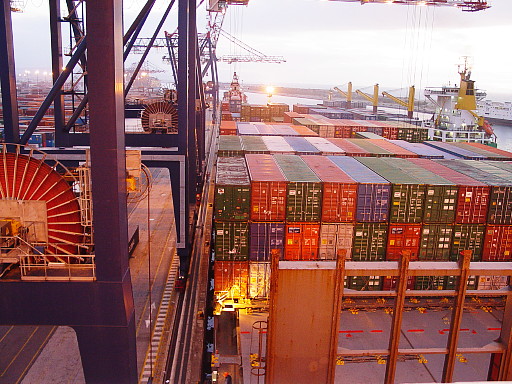 Waiting for the last containers to be loaded in Gioia Tauro so we can begin our journey. We were watching from our vantage point on the bridge. (13 Jan 2004) 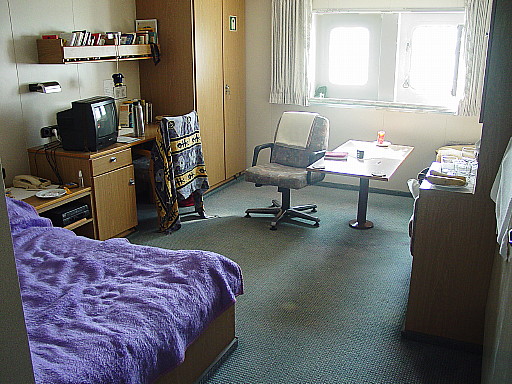 Our room on the Pacific Senator. (14 Jan 2004) 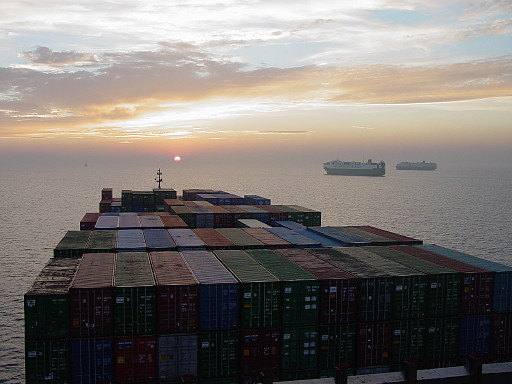 Sunset as we wait at anchor to enter the Suez Canal the next morning. (16 Jan 2004) 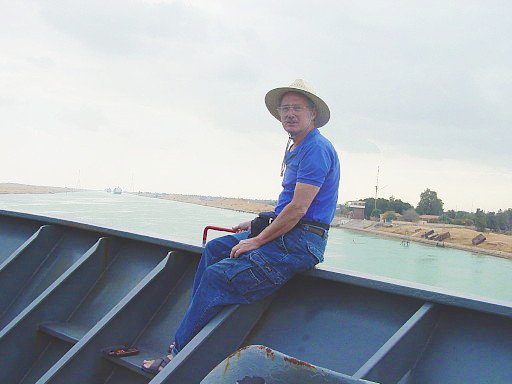 Early morning on the day after my 61st birthday, I sat on the bow as we begin our trip through the Suez Canal. My blood was tingling. I was sitting in the Suez Canal! (17 Jan 2004) 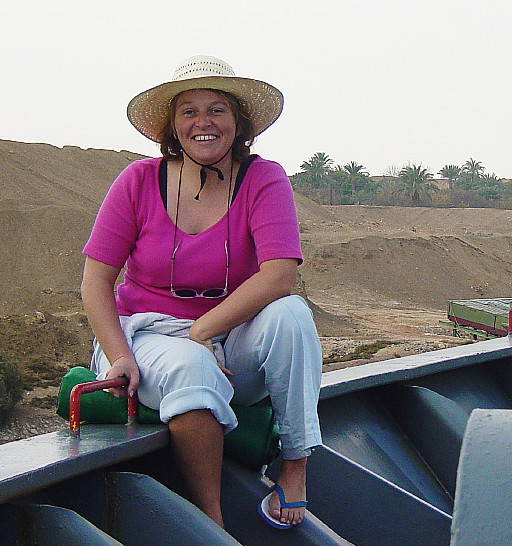 Petra sitting on the bow in the Suez Canal. (17 Jan 2004) 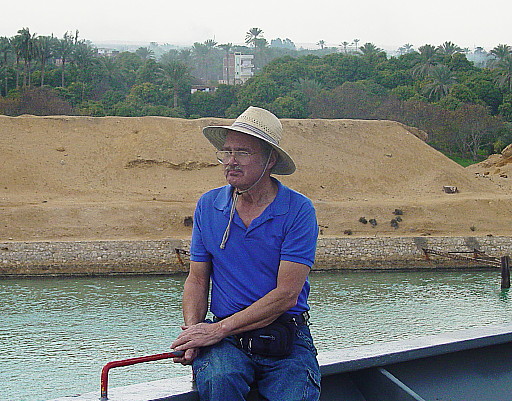 Mike still on the bow in the Suez Canal. (17 Jan 2004) 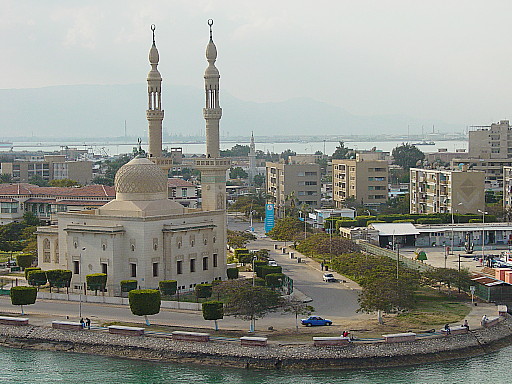 Port Suez on the south end of the canal. (17 Jan 2004) 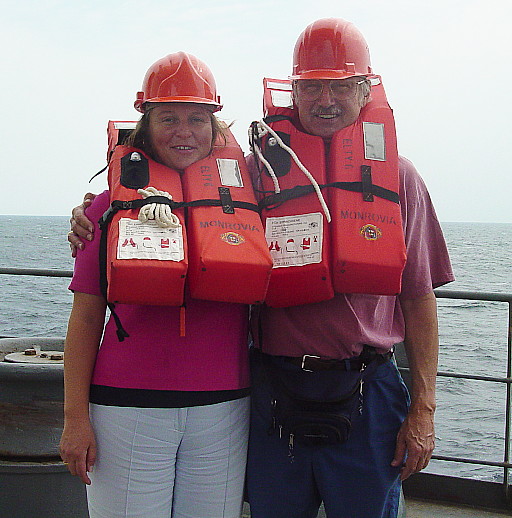 We're ready for the evacuation drill. (22 Jan 2004) 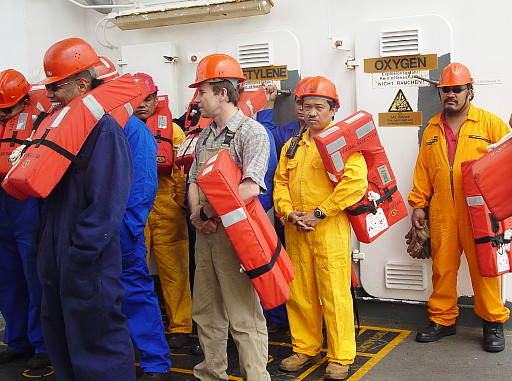 The rest of the crew is ready too. (22 Jan 2004) 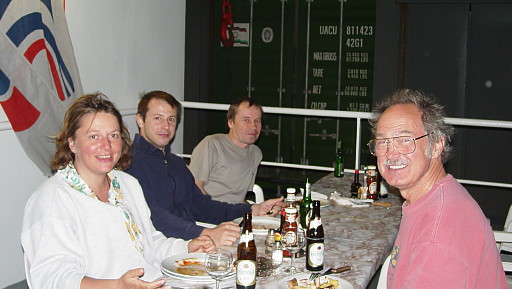 We sit with two of the three Russian engineers during our big Barbeque. (23 Jan 2004) 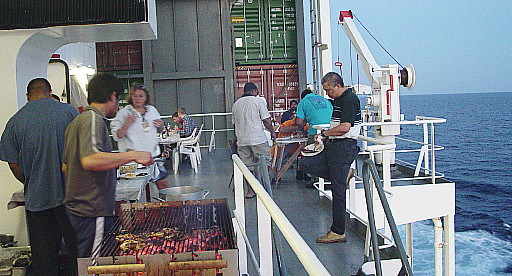 Meat is cooking and everyone mixing for the Barbeque. (23 Jan 2004) 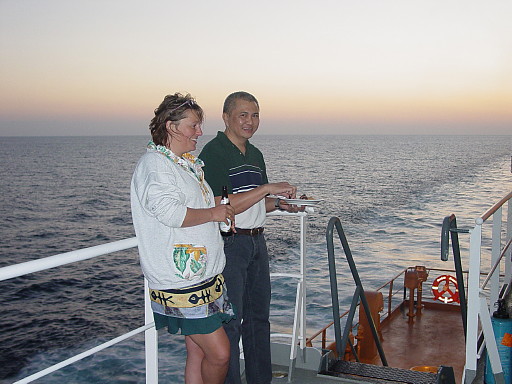 Petra talks with the Philippine mate at the Barbeque. (23 Jan 2004) 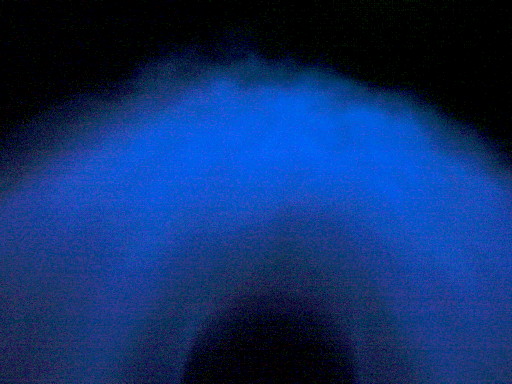 Microorganisms phosphoresce in this festinating glow as the bow wave compresses the water in front of the ship. (25 Jan 2004) 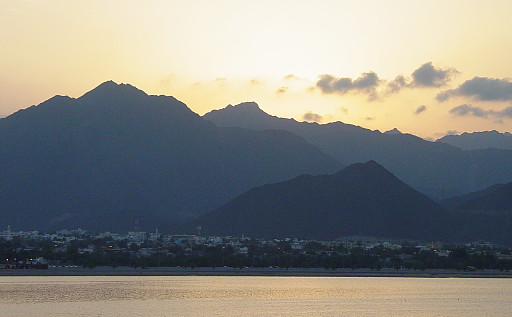 We stopped in Khor Fakkan in the United Arab Emerates as we moved south and east. (26 Jan 2004) 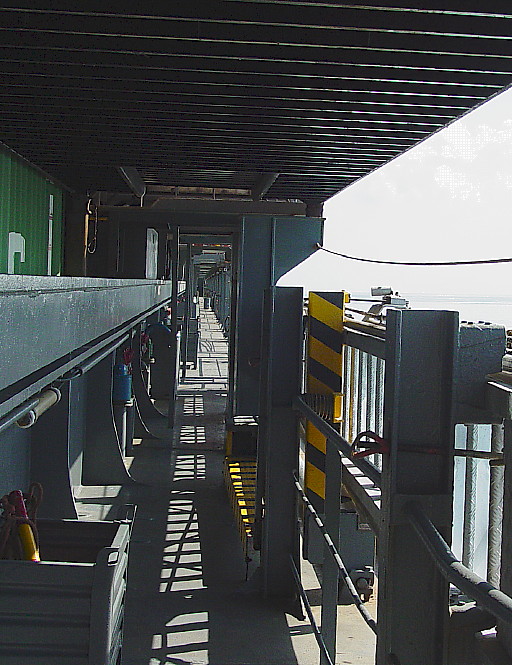 Starboard (right) side walkway. (28 Jan 2004) 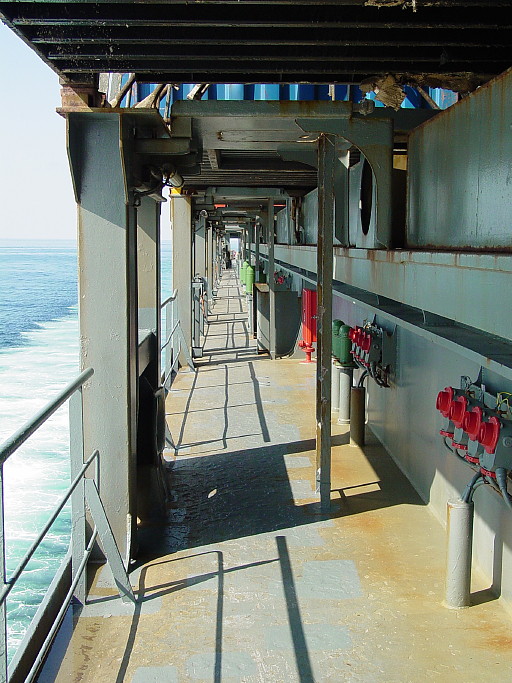 Port (left) side walkway. (28 Jan 2004) 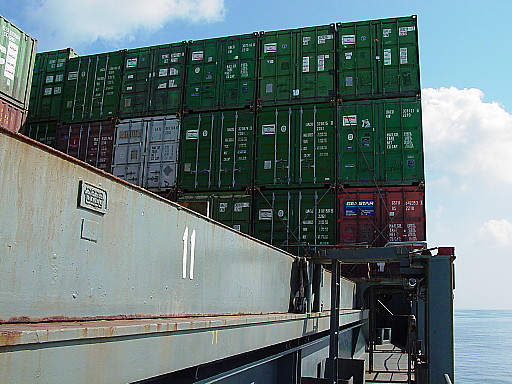 Some of our cargo. (28 Jan 2004) 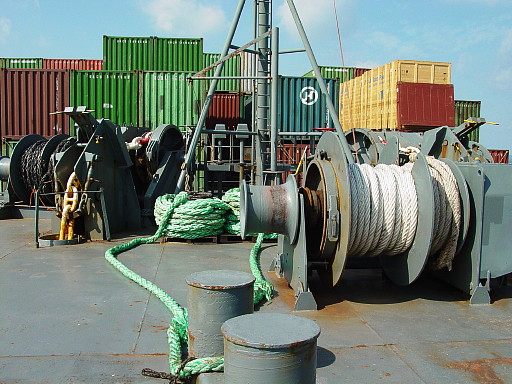 Anchors and ropes and cargo on the bow of the ship. (28 Jan 2004) 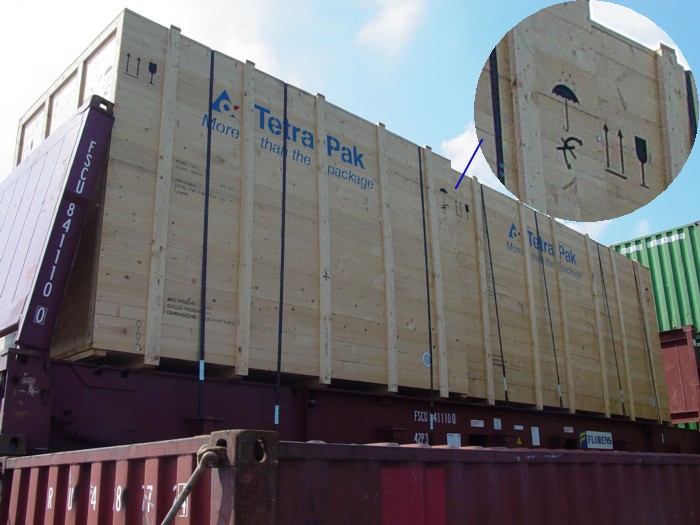 Look closely. This box is supposed to have a cover from the elements. It is lucky there were no elements happening because it was sitting in the open right on the very front of the ship (see previous picture). A wave over the bow would have drenched it. (28 Jan 2004) 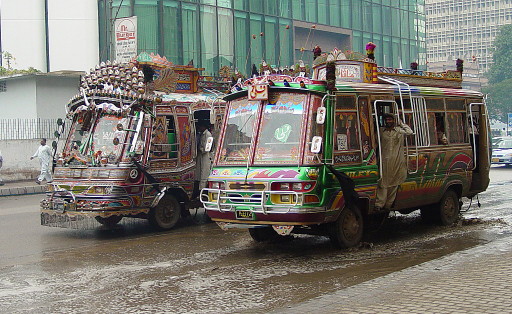 Two Karachi busses negotiate the water after a morning rain. (29 Jan 2004) 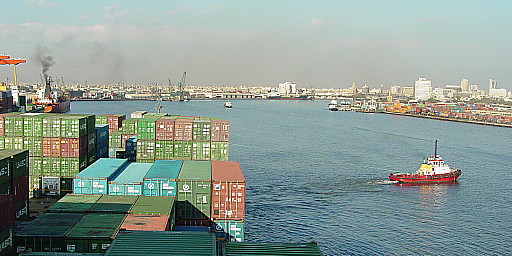 A tug pulls us around so we can leave our Karachi, Pakistan, birth and head onward to India. (30 Jan 2004) 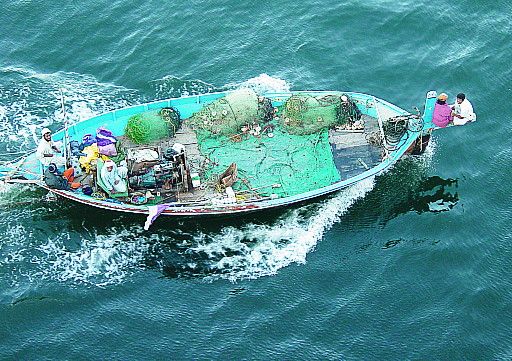 Two guys sit on the bow of a boat as it sails alongside as we leave Karachi. (30 Jan 2004)  We passed this unfortunate ship aground on the edge of the Karachi channel. (30 Jan 2004)  Building a port Indian style, one brick at a time. Mundra Harbor, Gujarat, India (31 Jan 2004) 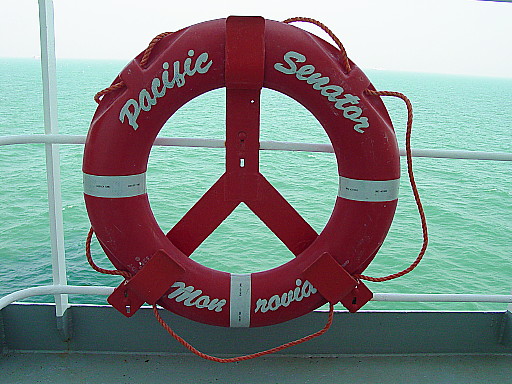 Our life saver. (2 Feb 2004) |
|
Changed: September 2015 |